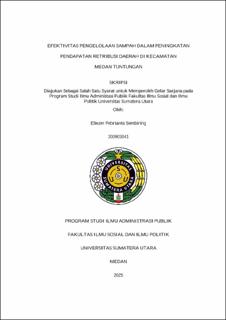Efeketivitas Pengelolaan Sampah dalam Peningkatan Pendapatan Retribusi Daerah di Kecamatan Medan Tuntungan
The Effectiveness of Waste Management in Increasing Regional Levy Revenue Medan Tuntungan District

Date
2025Author
Sembiring, Eliezer Pebrianta
Advisor(s)
Ginting, Simson
Metadata
Show full item recordAbstract
This study aims to analyze the effectiveness of waste management in increasing regional levies in Medan Tuntungan District, Medan City. The effectiveness of waste management is measured based on three main indicators according to Sugiyono in Budiani (2017): target accuracy, effectiveness of socialization, and effectiveness of monitoring. This research employs a qualitative method with a descriptive approach, involving observations, interviews, and document analysis to gather data from various stakeholders, including the Environmental Agency, district government, and local residents.
The findings indicate that the effectiveness of waste management still faces significant challenges. Target accuracy is not optimal due to weak levy registration systems, causing some households and businesses to be excluded. Effectiveness of socialization is also low, leading to a lack of public awareness about the importance of paying waste levies and their benefits for environmental cleanliness. Moreover, effectiveness of monitoring remains insufficient due to weak oversight mechanisms and a lack of transparency in fund management, resulting in public distrust in the existing system.
To improve the effectiveness of waste management and regional levy collection, this study recommends enhancing levy registration systems, strengthening community-based socialization programs, and implementing more transparent and accountable monitoring systems. By improving these aspects, waste management can become more efficient and contribute positively to increasing Regional Original Revenue (PAD).
Collections
- Undergraduate Theses [1957]
